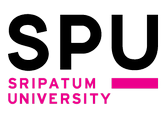Please use this identifier to cite or link to this item:
http://dspace.spu.ac.th/handle/123456789/5035| Title: | ตัวแบบความสัมพันธ์ระหว่างทุนทางสังคมกับการจัดการอย่างยั่งยืน ของภาคอุตสาหกรรมยางพาราภาคตะวันออกเฉียงเหนือตอนบน |
| Other Titles: | MODEL OF THE RELATIONSHIP BETWEEN SOCIAL CAPITAL AND SUSTAINABLE MANAGEMENT WITHIN THE RUBBER INDUSTRY SECTOR IN THE UPPER NORTH-EASTERN REGION |
| Authors: | วนิชย์ ไชยแสง |
| Keywords: | ทุนทางสังคม การจัดการอย่างยั่งยืน |
| Issue Date: | 2560 |
| Publisher: | หลักสูตรการจัดการดุษฎีบัณฑิต สาขาการจัดการธุรกิจ บัณฑิตวิทยาลัย มหาวิทยาลัยศรีปทุม |
| Citation: | วนิชย์ ไชยแสง. 2555. "ตัวแบบความสัมพันธ์ระหว่างทุนทางสังคมกับการจัดการอย่างยั่งยืน ของภาคอุตสาหกรรมยางพาราภาคตะวันออกเฉียงเหนือตอนบน." วิทยานิพนธ์การจัดการดุษฎีบัณฑิต สาขาการจัดการธุรกิจ บัณฑิตวิทยาลัย มหาวิทยาลัยศรีปทุม. |
| Series/Report no.: | 51860207_วนิชย์ ไชยแสง |
| Abstract: | การศึกษานี้มีวัตถุประสงค์เพื่อ 1) ศึกษาองค์ประกอบตัวแบบทุนทางสังคมและการจัดการอย่างยั่งยืนขององค์กร 2) ศึกษาอิทธิพลเชิงสาเหตุความสัมพันธ์ทุนทางสังคมที่มีผลต่อการดำเนินงานที่ยั่งยืนของกลุ่มอุตสาหกรรมยางพารา ด้วยการสำรวจเชิงคุณภาพและการวิจัยเชิงปริมาณโดยมีประชากรเป้าหมายกลุ่มตัวอย่างจำนวน 427 ตัวอย่าง จากกลุ่มเกษตรกรและสหกรณ์ยางพาราและหน่วยงานที่เกี่ยวข้องกับภาคอุตสาหกรรมยางพาราโดยจัดเก็บข้อมูลภาคสนามในพื้นที่ปลูกยางพาราใหม่ภาคตะวันออกเฉียงเหนือตอนบน 3 จังหวัดประกอบด้วย หนองคาย อุดรธานี และหนองบัวลำภู เครื่องมือวิจัยคือแบบสัมภาษณ์และแบบสอบถามและวิเคราะห์ข้อมูลด้วยการวิเคราะห์องค์ประกอบเชิงสำรวจ การวิเคราะห์องค์ประกอบเชิงยืนยันและการวิเคราะห์เส้นทางอิทธิพลได้ผลสรุปดังนี้ ผลการศึกษาพบว่าองค์ประกอบจากการสำรวจเชิงคุณภาพ ประกอบด้วยการแบ่งปันทรัพยากร การมีวิสัยทัศน์ร่วมกัน การได้ประโยชน์จากเครือข่ายและการดำเนินงานที่ยั่งยืนได้ข้อค้นพบที่สนับสนุนแนวคิดทุนทางสังคมว่ามีความสำคัญต่อการพัฒนากระบวนการดำเนินงานที่ยั่งยืนขององค์กรโดยเฉพาะในเชิงพื้นที่จากการร่วมมือกันในรูปแบบของกลุ่มเกษตรกรหรือสหกรณ์ ผลวิเคราะห์ด้วยสถิติขั้นสูงตัวแบบอิทธิพลเชิงสาเหตุทุนทางสังคมมีผลต่อการจัดการอย่างยั่งยืน ผลทดสอบสมมติฐานพบว่าการแบ่งปันทรัพยากรมีอิทธิพลเชิงบวกต่อการดำเนินงานที่ยั่งยืนในสมมติฐานที่ 4 โดยปฏิเสธสมมติฐานที่ 1 2 3 และ5 จากการทดสอบพบว่าตัวแบบมีความสอดคล้องกับข้อมูลเชิงประจักษ์ในเกณฑ์ที่ดี ตัวแปรทุนทางสังคมโดยเฉพาะการมีวิสัยทัศน์ร่วมกันและการแบ่งปันทรัพยากรมีอิทธิพลต่อการดำเนินงานที่ยั่งยืน ผลทดสอบค่าสัมประสิทธิ์อิทธิพลความสัมพันธ์การแบ่งปันทรัพยากรมีอิทธิพลโดยรวมต่อการดำเนินงานที่ยั่งยืนอย่างมีนัยสำคัญทางสถิติซึ่งเป็นอิทธิพลทางตรงและอิทธิพลทางอ้อม ข้อเสนอแนะการวิจัยด้วยการจัดตั้งกลุ่มเกษตรกรพร้อมๆ กับการสร้างกระบวนการดำเนินงานที่ยั่งยืนขององค์กรให้ครอบคลุมในทุกพื้นที่ซึ่งเกิดขึ้นจากความต้องการมีส่วนร่วมของเกษตรกรโดยเกิดจากความร่วมมือกันด้วยการแบ่งปันทรัพยากรที่มีอยู่จากทุนทางสังคมเพื่อให้เกิดเป็นการดำเนินงานขององค์การที่นำไปสู่การจัดการอย่างยั่งยืนในอนาคต The purposes of this research were: 1) to study the element of social capital model and the sustainable management of organization. 2) to study the causal influence and relationship of social capital which had an effect on sustainable performance of the rubber industrial sector. Qualitative survey and quantitative research had been used to collect the data from the target population of 427 samples of rubber farmer groups, rubber co-operatives, and government authorities relating to the rubber industry, by collecting the field data from the new rubber field which located in the upper North-eastern region of Thailand which cover three provinces namely :Nongkhai, Udonthani, and NongBuaLumPho such data collection was collected by interview and questionnaires and also the statistical techniques consisted of exploratory factor analysis, confirm factor analysis and path analysis which led to the conclusion as following: The results indicated that according to the qualitative survey, sharing resource, shared vision, advantage of network and sustainable performance supported the idea of social capital which was important to the development process of sustainable performance in the organization, especially in the area of cooperation in the farm of group of rubber farmer or robber co-operatives group. The analysis from advanced statistical of causal influence model illustrated that social capital affected the sustainable management. The hypothetical result future more, found that the sharing resource had positive impact on sustainable performance which was in the fourth hypothetical thinking however, it rejected the first, second, third and fifth hypothetical. There was a goodness of fitness test consistency between the empirical data and the model. The variable of social capital, especially shared vision and sharing resource had an impact to the sustainable performance. Sharing resource had the total effect as direct and indirect on the sustainable performance. The recommendation of the research is that the building process of sustainable performance in an organization together with establishing the rubber farmer group, which occurred from the willingness of participation of rubber farmer in sharing social capital resource will led it led to sustainable management of organization in the future. |
| URI: | http://dspace.spu.ac.th/handle/123456789/5035 |
| Appears in Collections: | GRA-10. วิทยานิพนธ์ปริญญาเอก |
Files in This Item:
| File | Description | Size | Format | |
|---|---|---|---|---|
| ปก วิทยานิพนธ์.pdf | 159.8 kB | Adobe PDF | View/Open | |
| เอกสารวิทยานิพนธ์ฉบับสมบูรณ์.pdf | 1.8 MB | Adobe PDF | View/Open |
Items in DSpace are protected by copyright, with all rights reserved, unless otherwise indicated.
Admin Tools
